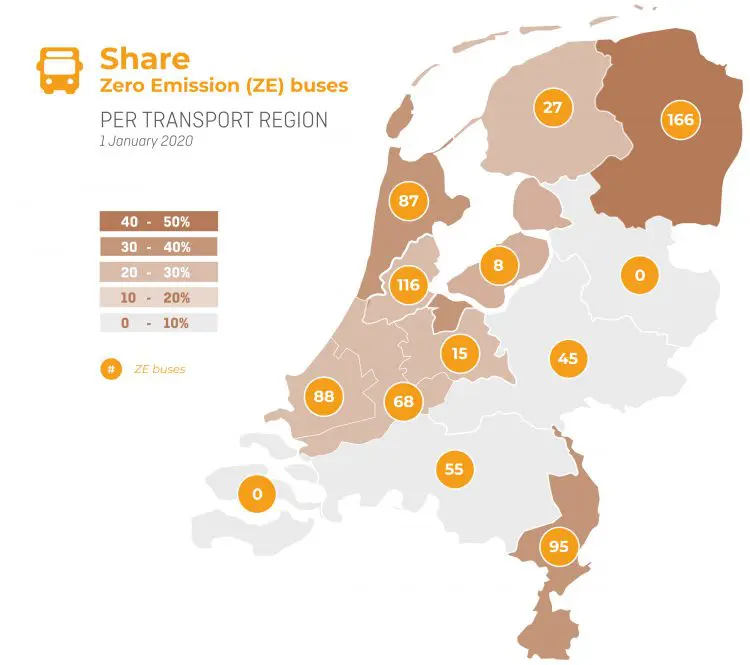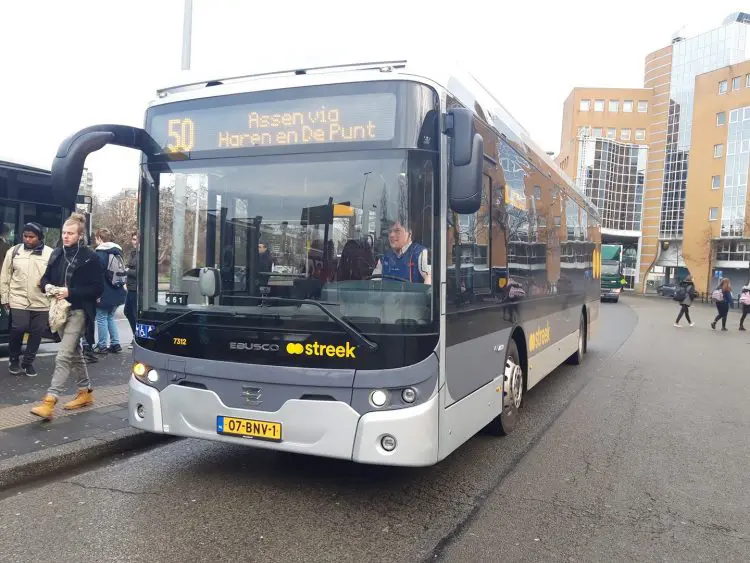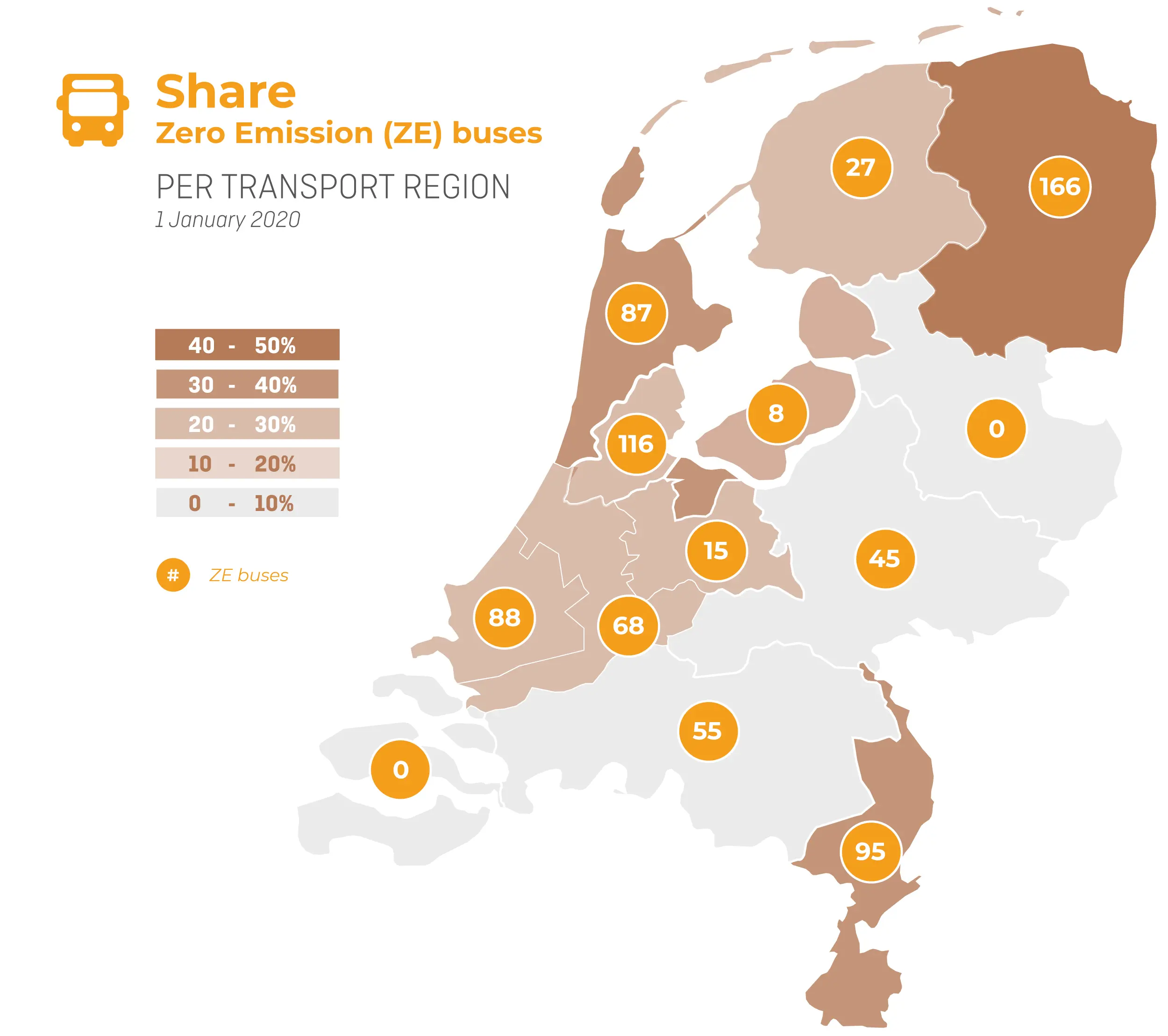The Dutch market, January 2020
The main reason for doing so is that the authorities responsible for procuring bus transport are very environmentally aware. The European Union has set stringent objectives for reducing CO2 emissions in the very near future. The Netherlands is the most progressive EU state in this regard. In 2016 the Dutch government signed an agreement with all public transport providers stipulating that no new diesel buses may be sold from 2025 and that from 2030 no diesel buses will be allowed to operate.
15% of all public transport buses in the Netherlands are now electric
By the end of 2018, there were 360 electric buses in the Dutch public transport system, but by the end of 2019 the number had already reached 770. This represents 15 percent of the entire Dutch fleet (5,236 buses). This was demonstrated in an -as yet unpublished- inventory by CROW, the public knowledge institution for infrastructure, traffic and transport.
This growth is now increasing rapidly; by the end of 2020 there will be almost 1,400 electric buses
The number of zero emission (ZE) buses is growing faster in the Netherlands than anywhere else in Europe. At least 618 more are expected in 2020, taking the total number of buses to 1,388.
For the period after 2021 almost one thousand ZE buses have already been ordered. The size of the entire bus fleet has remained more less stable over the years, at around 5,000 buses.
The provinces of Groningen and Drenthe are in first place
Groningen and Drenthe are by far the most electrified provinces in terms of public bus transport. In the north of the Netherlands, 47 percent of the buses are electric. Limburg (37 percent) and North Holland (31 percent) hold second and third place. But in Zeeland and Overijssel there is still not a single electric bus.

The differences in the regions have arisen due to the way Dutch public transport is organised. Transport companies compete against each other in tender processes for the right to provide transport in the region’s for a long period, often ten years. The Netherlands is divided into 34 regional concessions for this. Public transport authorities, usually the local council, launch a call for tenders and then select the transport company from that. They set demands for the quantity, but also for the equipment. The speed at which a transport in a region can become more sustainable therefore depends on how the transport company meets the demands set by their client, the local council. ‘Clean’ is not the cheapest option; an electric bus easily costs €400,000, twice as much as a diesel bus.
Groningen and Drenthe’s leading position is thanks to the new GD2020 concession. On 15 December 2019, Qbuzz began with 152 new electric buses: 60 regional buses and 92 city-centre buses.
The regional buses are all provided by Ebusco and have a range of +/- 350 kilometres. They are charged up mainly at night at one of the 8 depots in these two provinces.

Picture: Johan Pesulima (bus driver Qbuzz Groningen)
According to the province of Groningen and transport operator Qbuzz the bus fleet is ensuring 90 percent less CO2-emissions. “With this bus concession, in Groningen and Drenthe we are meeting the Paris Climate Agreement”, said their representative Fleur Gräper (Mobility, D66) at the celebrated launch on 29 November 2019.
Transport Companies
The CROW inventory shows which transport company is in the lead in the transition to electric buses. Qbuzz (an indirect subsidiary of the Italian national railway operator) has 224 ZE buses in operation. Connexxion (part of the French transport company Transdev) has 193. Arriva (part of Deutsche Bahn) is at number three, with 157 buses. Of the nine transport companies in the Netherlands, Amsterdam-based GVB is straggling behind; it’s the only one with no electric buses. In April, the first wave of 31 buses will arrive in Amsterdam.
Bus suppliers
Mainly 4 suppliers supplied these 770 electric buses. VDL supplied 486 electric buses. At number two, with 110 buses, is Ebusco from Deurne in the Netherlands, which develops and designs its electric buses entirely independently in the Netherlands. The buses, which are made from almost solely European parts, are then assembled in China. The French manufacturer Heuliez supplied 49 buses and the Chinese BYD supplied 44. The market share of Ebusco is 14% in the Netherlands (Jan 2020).
What will 2020 bring for the Netherlands
In 2020, around 600 new electric buses will arrive on Dutch roads. The 2 biggest orders are for Keolis (a subsidiary of the French transport company of the same name) where the Chinese BYD will supply 259 electric buses to Overijssel, Flevoland and Gelderland.
The second order is for Connexxion (part of the French transport company Transdev) where Ebusco will supply 156 buses to the concession AML and Haarlem IJmond. These buses will be on the road in Amsterdam, Haarlem and the surrounding areas from the end of 2020.
In addition, in the spring of 2020, Ebusco will also supply 20 new regional buses to Utrecht, where Ebusco’s city-centre buses have already been operating since September 2017.
Sources:
NRC, Mark Duursma (link)
CROW,
Qbuzz
 English
English  Nederlands
Nederlands  Deutsch
Deutsch  Français
Français  English (Australia)
English (Australia) 
